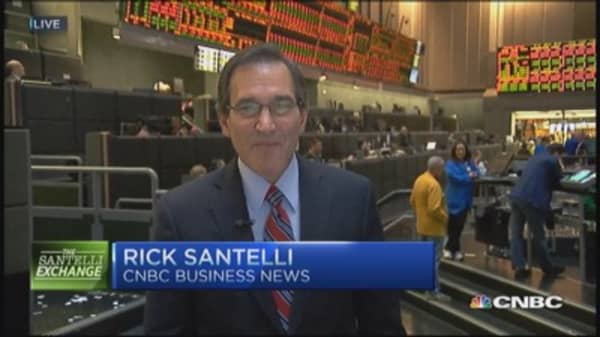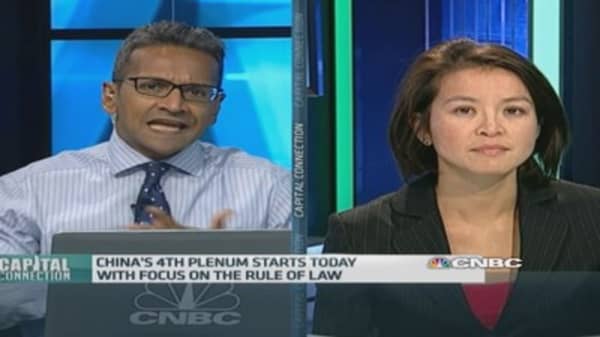The markets could be in for another rough ride Tuesday if China's latest report on gross domestic product shows a continuing slowdown in the world's second-largest economy.
After a massive stimulus in 2008—more than half a trillion dollars invested in new roads, airports, real estate and state-owned companies—China resumed its red-hot pace of growth. But this year, with growth slowing around the world, China's heavily export-driven gross domestic product has fallen below the government's 7.5 percent target.
"Other than the U.S., every other major export market—especially the eurozone—is looking very weak," said Eswar Prasad, a professor of trade policy at Cornell University.
The slowdown deepened in the latest quarter, as a once-booming real estate market began to cool, despite efforts by Beijing to prop up prices with looser credit.
Read MoreRussia downgrade: Can Putin shrug off the sanctions?
Forecasters polled by Reuters expect the official statistics Tuesday to show that growth fell to 7.3 percent, the weakest pace in more than five years. The slowdown raises the prospect of Beijing's taking more aggressive steps to boost growth with easier credit and lower interest rates.
Chinese leaders gathering this week in Beijing are also tackling a long list of legal and political reforms, including tighter controls at the provincial level on lending to state-run companies.
Those tighter controls—along with easier credit for smaller, more efficient, private companies—are part of a broader anti-corruption campaign launched by Beijing two years ago following widespread reports that local officials diverted much of the stimulus spending to their own bank accounts.
"The positive impact of these measures is likely to far outweigh any negative impact of the corruption campaign on the economy due to weaker demand for luxury goods, banquets and ill-gotten property," said Capital Economics China economist Julian Evans Pritchard in a note Monday.
Slowing domestic consumer demand poses a thorny problem for Chinese leaders as they struggle to transform the nation from an investment- to a consumer-driven economy. Though the 2008 stimulus propped up growth in the short run, it left the Chinese financial system with a massive hangover from money-losing state-owned businesses to piles of bad debts.
"They don't want to go back to the playbook of 2008-09," Prasad said. "They want to use targeted, selective measures that provide some stimulus but without backtracking on reforms. It's a very difficult balancing act."
Those efforts are further complicated by the ongoing real estate slowdown, which could become a bigger damper on household spending. Property represents about two-thirds of China's household wealth, compared with about 30 percent in the United States, according to a 2013 Capital Economics survey.
Slower consumer spending and weakening output growth are also weighing on commodity prices worldwide, as demand for raw materials from Chinese manufactures weakens.
"Deflation pressures are on the rise, and it's largely because of the weakness of domestic demand," said Donna Kwok, senior China economist at UBS.
Read MoreHong Kong crisis deepens; talks set for Tuesday
Ordinarily, that weak demand should be good news for buyers of Chinese exports. But even as the U.S. dollar has been gaining this year against most currencies—making foreign products cheaper for American consumers—China has been keeping a tight rein on exchange rates to minimize the impact on its local currency, the yuan. So Americans likely won't see bargain prices on Chinese-made toys this holiday season.
"Export prices for finished consumer's goods (aren't) falling," said High Frequency Economics chief Economist Carl Weinberg. "Not that Wal-Mart would pass the savings on to you if they did."
—By CNBC's John Schoen.
—Correction: An earlier version of the story incorrectly stated that China is the third-largest economy in the world. It should say second-largest.





